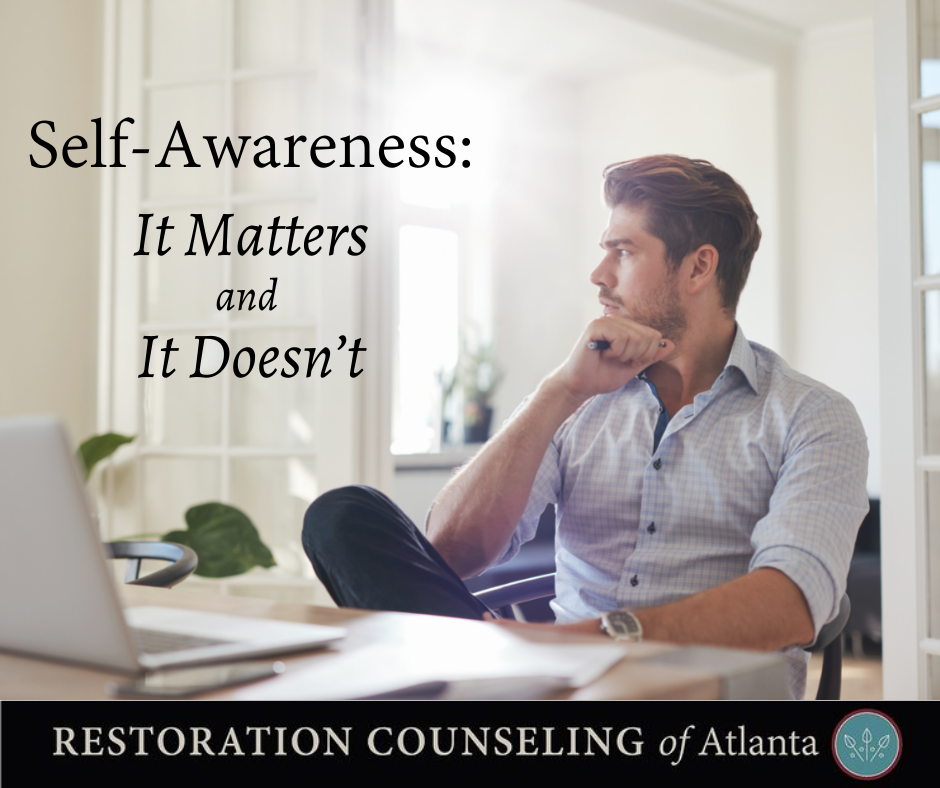What is self-awareness?
Self-awareness is a popular phrase these days. It is not uncommon to hear someone described as self-aware or wanting to grow in self-awareness. But how do we define self-awareness? My working definition is that self-awareness is when a person knows their blind spots, strengths, weaknesses, triggers, beliefs, etc. It is gaining insight into what makes you—you! Personality tests, working on teams, and having friends who challenge you are all ways to gain self-awareness.
Examples of a person with self-awareness include someone who:
- knows that they have a hard time accepting help from others;
- understands they need more alone time than their partner;
- realizes why a certain personality type is hard for them to be around;
- acknowledges that their expectations for others are high.
Benefits
Self-awareness is often a goal of therapy. For example, a client comes to a therapist because he knows he and his wife are not getting along, but he does not understand his role in their arguments. It would help for this client to grow in self-awareness. Our hypothetical client might realize after a couple of sessions that his strong personality causes his wife to emotionally shut down. A lightbulb goes off for the client, and this gives a potential direction for therapy to take.
Some general benefits of being self-aware are:
- being a more active participant in your life;
- having a better sense of what bothers you, what you like, etc.;
- understanding why you react in certain ways.
Once you know these things about yourself, it can help your relationships.
The flip side
A common misconception is that self-awareness is the main goal of therapy. In reality, it is a starting point. If the client with marital trouble stops his therapeutic journey at self-awareness, then his marriage would not improve for long. He knows he needs to work on learning how to talk to his wife without getting worked up, but his marriage is not going to improve with that insight alone.
This is where people want to quit coming to therapy because they feel initial relief at having words to describe the problem; however, this is actually when therapy becomes extra important. Once you see the problem, your therapist can give tools to help.
Because the couple has self-awareness, they will start noticing the problem everywhere. This is often the most difficult part of therapy. It is the equivalent of the couple noticing a mosquito buzzing around their heads but not knowing any techniques to get rid of it. It is encouraging to be aware that it is a mosquito and not an angry hornet, but the problem is not solved. After a while, this couple will feel stuck again. They have not yet figured out how to have productive conversations.
Now what?
What is beyond self-awareness? For our couple with communication problems, it will help to explore what in the husband’s childhood caused him to feel like he needed to have a strong personality to be heard. It will also be worth exploring what in the wife’s past caused her to shut down. They will benefit from working together to develop a new way of communicating. This allows them both to express themselves and feel heard by their partner.
Now that they have identified their need(s), they have to want to put in the work to change. Our couple will likely continue to step on one another’s toes from time to time, but with practice and getting back on the horse after falling off, they are extremely capable of working through their troubles. It is kind of like praying for patience—God in his humor will give opportunities to practice patience. A cycle of confessing, forgiving, and trying again will have far-reaching benefits.
Whether you want to start becoming more self-aware or feel like you have self-awareness and are ready for the next step on your journey, I would love to help you. Feel free to reach out to admin@restorationcounselingatl.com to make an appointment with me.

Written by Hannah Clark, APC
hannah@restorationcounselingatl.com, ext. 122
Roswell and Woodstock locations
Hannah Clark is a counselor offering therapeutic help to people from all walks of life. Her philosophy is that counseling is for everyone. Just like we go to the doctor for check-ups and take our cars to get the oil changed, mental health works the same way. Hannah has experience counseling individuals with issues such as trauma, PTSD, grief, depression, anxiety, career/life transitions, and shame. Hannah also works with married couples on their relationship and communication.

